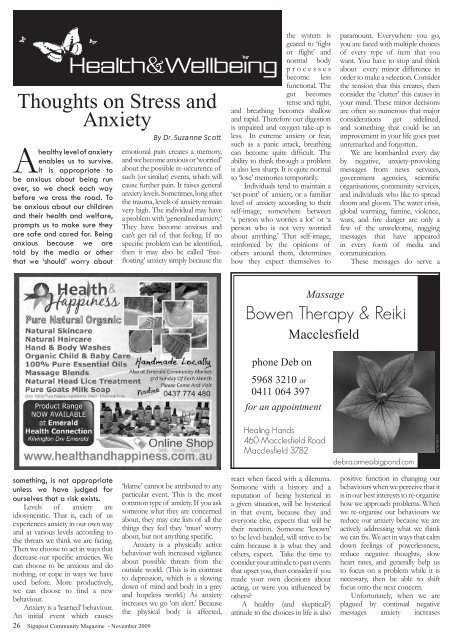You also want an ePaper? Increase the reach of your titles
YUMPU automatically turns print PDFs into web optimized ePapers that Google loves.
Thoughts on Stress and<br />
Anxiety By Dr. Suzanne Scott<br />
A<br />
healthy level of anxiety<br />
enables us to survive.<br />
It is appropriate to<br />
be anxious about being run<br />
over, so we check each way<br />
before we cross the road. To<br />
be anxious about our children<br />
and their health and welfare,<br />
prompts us to make sure they<br />
are safe and cared for. Being<br />
anxious because we are<br />
told by the media or other<br />
that we ‘should’ worry about<br />
something, is not appropriate<br />
unless we have judged for<br />
ourselves that a risk exists.<br />
Levels of anxiety are<br />
idiosyncratic. That is, each of us<br />
experiences anxiety in our own way<br />
and at various levels according to<br />
the threats we think we are facing.<br />
Then we choose to act in ways that<br />
decrease our specific anxieties. We<br />
can choose to be anxious and do<br />
nothing, or cope in ways we have<br />
used before. More productively,<br />
we can choose to find a new<br />
behaviour.<br />
Anxiety is a ‘learned’ behaviour.<br />
An initial event which causes<br />
26 <strong>Signpost</strong> Community <strong>Magazine</strong> - <strong>Nov</strong>ember <strong>2009</strong><br />
emotional pain creates a memory,<br />
and we become anxious or ‘worried’<br />
about the possible re-occurence of<br />
such (or similar) events, which will<br />
cause further pain. It raises general<br />
anxiety levels. Sometimes, long after<br />
the trauma, levels of anxiety remain<br />
very high. The individual may have<br />
a problem with ‘generalised anxiety.’<br />
They have become anxious and<br />
can’t get rid of that feeling. If no<br />
specific problem can be identified,<br />
then it may also be called ‘freefloating’<br />
anxiety simply because the<br />
‘blame’ cannot be attributed to any<br />
particular event. This is the most<br />
common type of anxiety. If you ask<br />
someone what they are concerned<br />
about, they may cite lists of all the<br />
things they feel they ‘must’ worry<br />
about, but not anything specific.<br />
Anxiety is a physically active<br />
behaviour with increased vigilance<br />
about possible threats from the<br />
outside world. (This is in contrast<br />
to depression, which is a slowing<br />
down of mind and body in a grey<br />
and hopeless world.) As anxiety<br />
increases we go ‘on alert.’ Because<br />
the physical body is affected,<br />
the system is<br />
geared to ‘fight<br />
or flight’ and<br />
normal body<br />
processes<br />
become less<br />
functional. The<br />
gut becomes<br />
tense and tight,<br />
and breathing becomes shallow<br />
and rapid. Therefore our digestion<br />
is impaired and oxygen take-up is<br />
less. In extreme anxiety or fear,<br />
such as a panic attack, breathing<br />
can become quite difficult. The<br />
ability to think through a problem<br />
is also less sharp. It is quite normal<br />
to ‘lose’ memories temporarily.<br />
Individuals tend to maintain a<br />
‘set-point’ of anxiety, or a familiar<br />
level of anxiety according to their<br />
self-image, somewhere between<br />
‘a person who worries a lot’ or ‘a<br />
person who is not very worried<br />
about anything.’ That self-image,<br />
reinforced by the opinions of<br />
others around them, determines<br />
how they expect themselves to<br />
react when faced with a dilemma.<br />
Someone with a history and a<br />
reputation of being hysterical in<br />
a given situation, will be hysterical<br />
in that event, because they and<br />
everyone else, expects that will be<br />
their reaction. Someone ‘known’<br />
to be level-headed, will strive to be<br />
calm because it is what they and<br />
others, expect. Take the time to<br />
consider your attitude to past events<br />
that upset you, then consider if you<br />
made your own decisions about<br />
acting, or were you influenced by<br />
others?<br />
A healthy (and skeptical?)<br />
attitude to the choices in life is also<br />
paramount. Everywhere you go,<br />
you are faced with multiple choices<br />
of every type of item that you<br />
want. You have to stop and think<br />
about every minor difference in<br />
order to make a selection. Consider<br />
the tension that this creates, then<br />
consider the ‘clutter’ this causes in<br />
your mind. These minor decisions<br />
are often so numerous that major<br />
considerations get sidelined,<br />
and something that could be an<br />
improvement in your life goes past<br />
unremarked and forgotten.<br />
We are bombarded every day<br />
by negative, anxiety-provoking<br />
messages from news services,<br />
government agencies, scientific<br />
organisations, community services,<br />
and individuals who like to spread<br />
doom and gloom. The water crisis,<br />
global warming, famine, violence,<br />
wars, and fire danger are only a<br />
few of the unwelcome, nagging<br />
messages that have appeared<br />
in every form of media and<br />
communication.<br />
These messages do serve a<br />
<br />
<br />
<br />
<br />
<br />
<br />
<br />
<br />
<br />
<br />
<br />
<br />
positive function in changing our<br />
behaviours when we perceive that it<br />
is in our best interests to re-organise<br />
how we approach problems. When<br />
we re-organise our behaviours we<br />
reduce our anxiety because we are<br />
actively addressing what we think<br />
we can fix. We act in ways that calm<br />
down feelings of powerlessness,<br />
reduce negative thoughts, slow<br />
heart rates, and generally help us<br />
to focus on a problem while it is<br />
necessary, then be able to shift<br />
focus onto the next concern.<br />
Unfortunately, when we are<br />
plagued by continual negative<br />
messages anxiety increases





